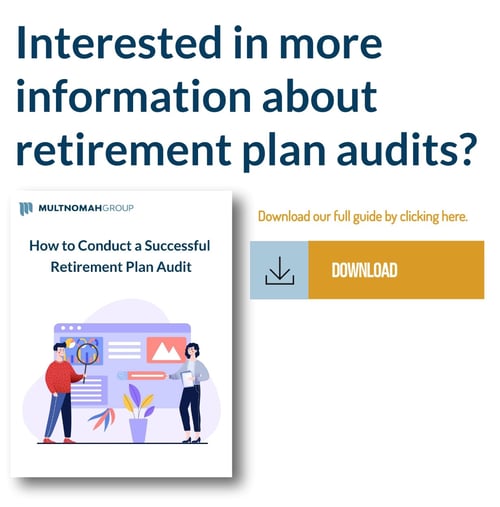 Your retirement plan audit has been completed, now what? You may think the completion of the audit ends the work to be done, but that’s not the case. Don’t forget you need to review any communication letters from the auditor and take action if needed.
Your retirement plan audit has been completed, now what? You may think the completion of the audit ends the work to be done, but that’s not the case. Don’t forget you need to review any communication letters from the auditor and take action if needed.
If your retirement plan is auditable, your auditors are required to make certain communications to “those charged with governance,” such as the plan sponsor or committee with the responsibility for overseeing the plan’s operations. These communications are usually issued via one of two communication letters:
(1) the SAS 114: The Auditor’s Communication with Those Charged with Governance letter or (2) the SAS 115 Letter: Communicating Internal Control Related Matters Identified in an Audit.
Even if your plan auditor does not identify material weaknesses or deficiencies that would require written communication, he or she is likely to communicate any insignificant deficiencies or recommendations for how to improve the plan’s operations, security or governance via a “Management Letter.” Some auditors may prefer to have a conversation with the plan sponsor or committee in charge of the plan to make sure the comments are understood.
For most plans, the plan sponsor or committee charged with governance may include the audit committee of the Board or the appropriate group overseeing the financial reporting process of the plan, such as the employee benefits committee, administrative committee, plan administrator, or responsible party. For some plans, it may be a single executive, such as the chief financial officer.
The plan sponsor or committee charged with governance of your plan should expect to receive and review these communications from your plan auditor with the understanding that the Department of Labor will often see a copy of the auditor’s findings as well as any successor auditor.
This “SAS 114” letter is an American Institute of CPAs (AICPA) required communication letter for all financial statement audits. The letter's purpose is to communicate to those charged with governance, any significant findings, and other information, such as disagreements with management, audit adjustments, and significant estimates that aren’t communicated in the audited financial statements. These are findings that must be understood and addressed by the Persons charged with governance.
The “SAS 115” letter is usually issued when any significant deficiencies or material weaknesses would have been discussed with management during the audit but is not required to be communicated in written form. In performing an audit of your plan’s internal controls and plan financials, your auditors are required to obtain an understanding of the plan’s operations and internal controls. In doing so, they may become aware of matters related to your plan’s internal control that may be considered deficiencies, significant deficiencies, or material weaknesses.
These are matters that the sponsor or committee in charge of the plan must familiarize themselves with to establish a correction and prevention plan.
Following is a description of each potential observation:
Deficiencies in Internal Control. A deficiency in internal control exists when the design or operation of a control does not allow management or employees, in the normal course of performing their assigned functions, to prevent, or detect, and correct misstatements on a timely basis.
Significant Deficiencies. A significant deficiency is a deficiency, or a combination of deficiencies, in internal control that is less severe than a material weakness, yet important enough to merit attention by those charged with governance.
Material Weaknesses. A material weakness is a deficiency, or combination of deficiencies, in internal control, such that there is a reasonable possibility that a material misstatement of the entity’s financial statements will not be prevented, or detected, and corrected on a timely basis.
As mentioned earlier, auditors are not required to make these communications in writing (SAS 115 letter) unless, in the auditor’s professional judgment, verbal communication would not be adequate. Therefore, no letter can be a good thing but is not an all clear signal.
Regardless of the form of communication, both letters should be reviewed with each affected party to ensure the accuracy of plan operations and the integrity of the plan’s assets and financial reporting.
Multnomah Group is a registered investment adviser, registered with the Securities and Exchange Commission. Any information contained herein or on Multnomah Group’s website is provided for educational purposes only and does not intend to make an offer or solicitation for the sale or purchase of any specific securities, investments, or investment strategies. Investments involve risk and, unless otherwise stated, are not guaranteed. Multnomah Group does not provide legal or tax advice.

